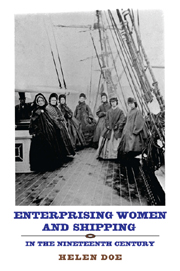Book contents
- Frontmatter
- Contents
- List of Tables and Figures
- List of Illustrations
- Dedication
- Acknowledgements
- Abbreviations
- Introduction
- 1 The Legal, Financial and Cultural Environment
- 2 Maritime Communities
- 3 Five Investor Ports
- 4 Shipowning Wives, Widows and Spinsters
- 5 Active and Passive Female Shipowners
- 6 Managing Owners
- 7 Port Businesswomen
- 8 Warship Builders
- 9 Merchant Shipbuilders
- 10 Conclusion: ‘A Respectable and Desirable Thing’
- Appendices
8 - Warship Builders
Published online by Cambridge University Press: 12 September 2012
- Frontmatter
- Contents
- List of Tables and Figures
- List of Illustrations
- Dedication
- Acknowledgements
- Abbreviations
- Introduction
- 1 The Legal, Financial and Cultural Environment
- 2 Maritime Communities
- 3 Five Investor Ports
- 4 Shipowning Wives, Widows and Spinsters
- 5 Active and Passive Female Shipowners
- 6 Managing Owners
- 7 Port Businesswomen
- 8 Warship Builders
- 9 Merchant Shipbuilders
- 10 Conclusion: ‘A Respectable and Desirable Thing’
- Appendices
Summary
The most prominent business in a maritime community was the shipbuilding yard. It was physically large, noisy and used a large amount of labour, and on its output rested many other businesses such as sailmakers, ropemakers and blockmakers. The largest yards were major industrial concerns in their time directly employing hundreds of men. Women feature as the owners of shipbuilding yards throughout the nineteenth century and in this chapter one specialised area of shipbuilding will be considered. The building of warships was high value and high risk to the shipbuilder and the peak time for navy contracts with merchant yards was during the French Revolutionary and Napoleonic wars. What was it like to deal with such a large customer and how well was a woman accepted in this role? Unlike the community-based examples in the next chapter, where there might be an element of local support for a widow, warship builders could not expect any favours from the Navy Board and competition was both national and intense. The two examples discussed here are Mrs Frances Barnard of London, who owned her yard from 1796 until 1825, and Mrs Mary Ross, who owned her yard on the Medway from 1808 to 1815. Both examples will be considered in the overall context of the merchant yards of the time.
Building for the Navy
Mrs Frances Barnard's yard at Deptford was one of the largest yards in England and built ships for the East India trade and warships for the navy. Mrs Ross of Rochester also built warships and ships for the Hudson’s Bay Company, but her operation was on a smaller scale than Barnard’s. Both women, however, had to deal with the formidable Navy Board.
- Type
- Chapter
- Information
- Enterprising Women and Shipping in the Nineteenth Century , pp. 172 - 192Publisher: Boydell & BrewerPrint publication year: 2009



